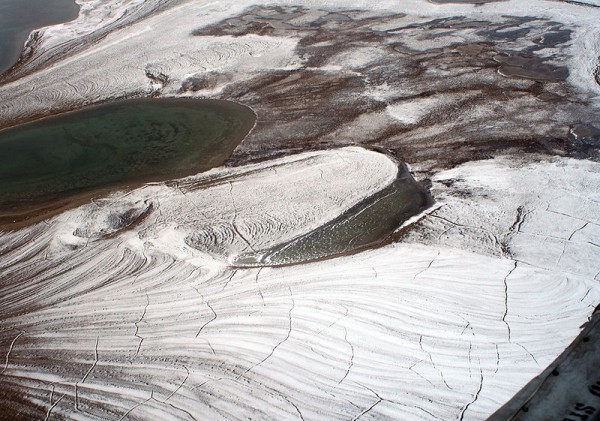By Ana Verayo, | December 04, 2016

Crack pattern of permafrost in the high Arctic region. (Brocken Inaglory/CC BY-SA 3.0)
According to a new study, increasing global temperatures can prevent the planet's soil from acting as a natural "carbon sink." About 55 trillion kilograms of carbon dioxide and greenhouse gasses are expected to be released from the ground into the atmosphere by 2050.
Scientists from Yale University have determined that due to increasing global temperatures caused by man-made activities, the Earth's soil is estimated to release 17 percent more carbon compared to past projections.
Like Us on Facebook
Researchers said this amount of carbon is similar to adding a newly industrialized nation the size of the Unites States to the planet. Polar regions will be the most affected, releasing higher amounts of carbon, including those areas located at higher latitudes.
Past studies have investigated carbon loss from temperate regions on the planet which are considerably smaller carbon sinks. However, the largest carbon sinks on Earth are found in the coldest places on Earth.
Colder and higher latitude regions have massive carbon stocks since carbon has been stored in soil and ice for almost ten thousand years. This carbon is locked deep under frozen soil due to microbial ecosystems in permafrost.
However, according to the lead author of the study, Thomas Crowther of the Yale School of Forestry & Environmental Studies and the Netherlands Institute of Ecology, carbon is stored in the Arctic and the sub-regions of the Arctic in soil that is frozen which means that there is less microbial activity, leading to carbon build up in the following centuries.
Crowther explained, however, that if the planet begins to warm, the microbial activity also increases and carbon loss begins to occur.
The team collected soil carbon data from various studies over the past 20 years. The scientists estimate that 30 petagrams of soil carbon will be released into the atmosphere for every degree of warming. This is also twice the amount of carbon released due to man-made activities in 2015.
The team concluded that carbon emissions from the soil would rise by 12 to 17 percent by 2050 which will lead to global temperatures increasing by two degrees.
This new study was published in the journal Nature.
-
Use of Coronavirus Pandemic Drones Raises Privacy Concerns: Drones Spread Fear, Local Officials Say

-
Coronavirus Hampers The Delivery Of Lockheed Martin F-35 Stealth Fighters For 2020

-
Instagram Speeds Up Plans to Add Account Memorialization Feature Due to COVID-19 Deaths

-
NASA: Perseverance Plans to Bring 'Mars Rock' to Earth in 2031

-
600 Dead And 3,000 In The Hospital as Iranians Believed Drinking High-Concentrations of Alcohol Can Cure The Coronavirus

-
600 Dead And 3,000 In The Hospital as Iranians Believed Drinking High-Concentrations of Alcohol Can Cure The Coronavirus

-
COVID-19: Doctors, Nurses Use Virtual Reality to Learn New Skills in Treating Coronavirus Patients







